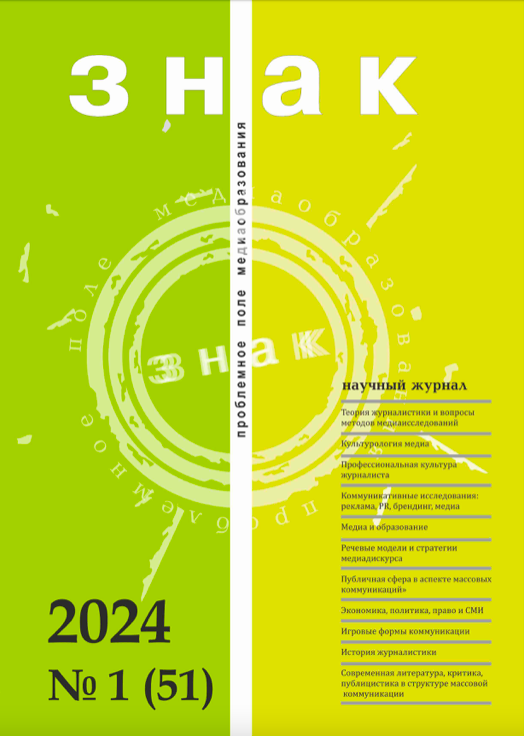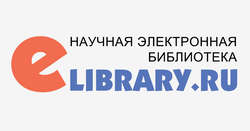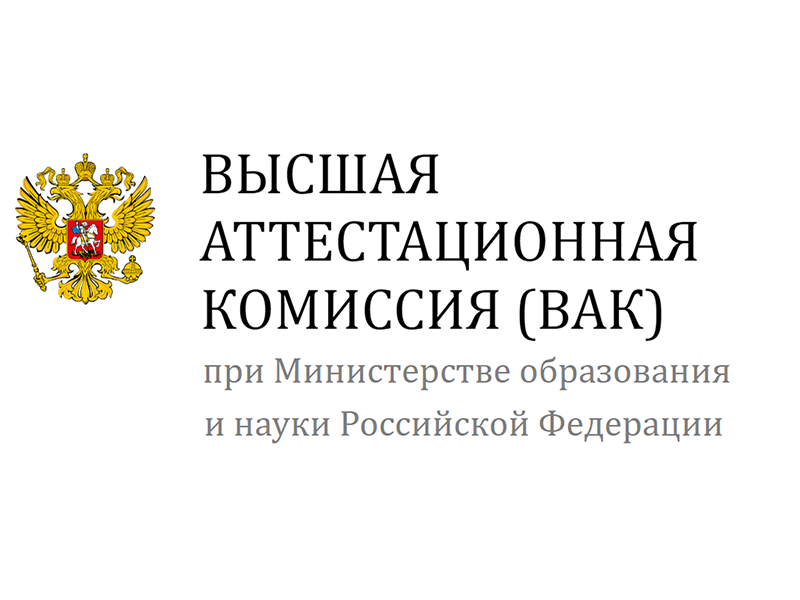Студенты глазами преподавателей: особенности обучающихся медийных специальностей
DOI:
https://doi.org/10.47475/2070-0695-2024-51-1-31-38Ключевые слова:
высшее образование, медиаобразование, студенческая среда, трансформация образованияАннотация
Статья предлагает рассмотреть личностные, социальные, психологические и другие особенности студентов, выбирающих направления подготовки, связанные с медиаиндустрией. Опираясь на тезисы о качественной инакости современных студентов, вызванной высокой погруженностью в медиасреду, автор предполагает, что студенты-медийщики наиболее ярко отражают изменения, происходящие сегодня в студенческой среде. Также исследовательского внимания требуют особенности профессии журналиста, изучаемые на протяжении уже нескольких десятилетий, и являющейся ее наследницей профессии медийщика, более актуальной, но менее изученной. В рамках исследования были проведены 50 глубинных интервью с преподавателями, работающими в медийных образовательных программах в столичных и региональных вузах. Также автор опирается на личный опыт преподавания у студентов-медийщиков, включающий наблюдение и беседы с коллегами и студентами. Совокупность эмпирического материала позволила получить достаточно объемный портрет студента-медийщика. Его основными отличительными характеристиками оказались: высокая погруженность в медиасреду, наличие профессионального опыта еще на входе в вуз (полученного в профильных секциях или в личных проектах), размытая мотивация к получению высшего образования, ориентация на практическую деятельность и субъективную полезность образования, высокая гражданская активность в публичном пространстве, неприятие авторитетов. Также важным отличие студентов-медийщиков является раннее успешное начало профессиональной деятельности и получение от нее доходов, что значительно снижает ощущение ценности и потребности в высшем образовании.
Библиографические ссылки
Anan'ev, B. G. (2018). CHelovek kak predmet poznaniya [Man as an object of knowledge]. SPb.: Piter Publ. 288 p. (in Russ).
Meshcheryakova, B. G. & Zinchenko, V. P. (Eds.) (2008). Bol'shoj psihologicheskij slovar' [Big psychological dictionary]. Moscow: AST Publ. 811 p. (in Russ).
Burdieu, P. (2002). O televidenii i zhurnalistike [On television and journalism]. Moscow: Fond nauchnyh issledovanij «Pragmatika kul'tury» Publ. 160 p. (in Russ).
Vyrkovskij, A. V. & Kruglikova, M. V. (2014). Otnoshenie k rabochemu processu zhurnalistov kachestvennyh SMI [Attitude towards the workflow of quality media journalists]. Mediaskop, 4, availiable at: http://www.mediascope.ru/1664 (accessed: 08.08.2019). (in Russ).
Vyrkovskij, A. V. & Lavrenova, A. V. (2015). Professional'nye i lichnye kachestva rossijskih zhurnalistov: ocenka menedzherov pechatnyh i internet-SMI [Professional and Personal Qualities of Russian Journalists: Assessed by Print and Online Media Managers]. MediaAl'manah, 2, 49–56. (in Russ).
Dudchenko, Z. F. (2014). Lichnostnye osobennosti uspeshnyh zhurnalistov [Personal characteristics of successful journalists]. Uchenye zapiski SPbGIPSR, Vol. 21, 1, 7–12. (in Russ).
Klochkova, A. V. & Zaharenko, N. A. (2023). Social'no-psihologicheskoe samochuvstvie studentov: rezul'taty sociologicheskogo issledovaniya [Socio-psychological well-being of students: results of a sociological study]. Pedagogika i psihologiya obrazovaniya, 1, 176–189. (in Russ).
Lazutina, G. V. (2019). Deontologiya zhurnalistiki kak sfera nauchnogo znaniya [Deontology of journalism as a field of scientific knowledge]. Social'no-gumanitarnye znaniya, 8, 202–219. (in Russ).
Lazutina, G. V. (2009). Osobennosti professional'noj deyatel'nosti zhurnalista s pozicii sistemnogo podhoda k ee izucheniyu [Features of the professional activity of a journalist from the standpoint of a systematic approach to its study]. Vestnik MGU. Series 10: ZHurnalistika, 5, 80–93. (in Russ).
Prohorov, E. P. (2009). Vvedenie v teoriyu zhurnalistiki [Introduction to journalism theory]. Moscow: Aspekt-Press Publ. 351 p. (in Russ).
Radaev, V. V. (2023). Prepodavanie v krizise [Teaching in crisis] Moscow: HSE Publ. 200 p. (in Russ).
Svitich, L. G. (2023). Sociologiya zhurnalistiki [Sociology of journalism]. Moscow: YUrajt Publ. 397 p. (in Russ).
Smirnova, O. V., Demina, I. N., Steblovskaya, S. B. & SHkondin, M. V. (2022). ZHurnalistika kak faktor preodoleniya haotizacii mira povsednevnosti [Journalism as a factor in overcoming the chaos of the world of everyday life]. Vestnik VUiT, 2 (38), 257–267. (in Russ).
Trubnikova, N. I., Malikova, E. V. & Manuzina, E. B. (2020). Emocional'nyj intellekt kak professional'no vazhnoe kachestvo vypusknikov pedagogicheskogo vuza [Emotional intelligence as a professionally important quality of graduates of a pedagogical university]. Vestnik Altajskogo gosudarstvennogo pedagogicheskogo universiteta, 4, 67–71. (in Russ).
Trufanova, E. O. (2017). «Situacionnoe znanie» i ideal ob"ektivnosti v nauke ["Situational knowledge" and the ideal of objectivity in science]. Epistemology & Philosophy of Science, 4, 310–312. (in Russ).
SHesterkina, L. P. (Ed.) (2016). Universal'naya zhurnalistika [Universal journalism]. Moscow: Aspekt-Press Publ 480 p. (in Russ).
Загрузки
Опубликован
Как цитировать
Выпуск
Раздел
Лицензия
Copyright (c) 2024 Знак: проблемное поле медиаобразования

Это произведение доступно по лицензии Creative Commons «Attribution-NonCommercial-NoDerivatives» («Атрибуция — Некоммерческое использование — Без производных произведений») 4.0 Всемирная.




